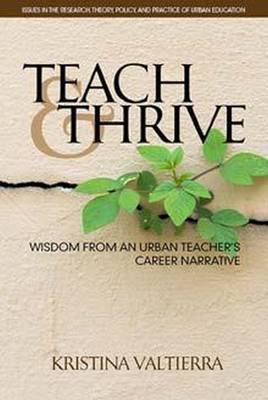Issues in the Research, Theory, Policy, and Practice of Urban Education
1 total work
Teacher burn out contributes to the epidemic of early career exit. At least half of all new K?12 teachers leave theprofession by the time they reach their fifth year of teaching. Conversely, there are urban teachers who survive burn out and thrive as career? long educators. This book results from an in?depth qualitative study that explored one 40?year veteran teacher's career narrative, analyzing how she not only survived the burn out epidemic, but also thrived as a highly effective career?long urban teacher.
Part 1 of this book uses a critical socio?political lens is used to guide readers through the complexities of career thrival. Framed within the story of one new urban teacher's typical morning, the book begins with an overview of the socio?political forces that lead to urban teacher burn out. In spite of the obstacles, the more hopeful idea of urban teacher thrival is uncovered through narrative methodology. Part 2 is dedicated to the dynamic narrative of a veteran urban teacher career journey. This inspiring story is related to frameworks established in Part 1, as well as painting a picture of how public education has evolved over the last 40 years, and it's impact on the lives of teachers.
Part 3 takes a deeper dive into three salient themes that permeated throughout the participant's story. First hope springs eternal is the idea that sustaining hope supported the teacher's career thrival. Next, the extended education family is the notion that familial?like relationships at school nourished her longevity. The third theme, creative autonomy, reveals that by being empowered with opportunities for curriculum development and instructional decision?making the teacher maintained her passion. This book concludes with recommendations for teachers, educational leaders and teacher educators to develop and maintain thriving teachers.
Part 1 of this book uses a critical socio?political lens is used to guide readers through the complexities of career thrival. Framed within the story of one new urban teacher's typical morning, the book begins with an overview of the socio?political forces that lead to urban teacher burn out. In spite of the obstacles, the more hopeful idea of urban teacher thrival is uncovered through narrative methodology. Part 2 is dedicated to the dynamic narrative of a veteran urban teacher career journey. This inspiring story is related to frameworks established in Part 1, as well as painting a picture of how public education has evolved over the last 40 years, and it's impact on the lives of teachers.
Part 3 takes a deeper dive into three salient themes that permeated throughout the participant's story. First hope springs eternal is the idea that sustaining hope supported the teacher's career thrival. Next, the extended education family is the notion that familial?like relationships at school nourished her longevity. The third theme, creative autonomy, reveals that by being empowered with opportunities for curriculum development and instructional decision?making the teacher maintained her passion. This book concludes with recommendations for teachers, educational leaders and teacher educators to develop and maintain thriving teachers.
